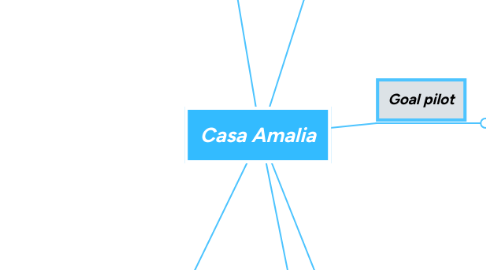
1. Collaborative partners
1.1. Haastu
1.1.1. The initiator and trigger of this project
1.1.2. Willem Jansen who is working here will coordinate the project.
1.2. IofC
1.2.1. A collaborative partner that contributes to this pilot by making 1 day per week available for project coordination.
1.2.2. In addition, the activities will take place in the center of IofC and will support this organization in communication and PR to the outside.
1.3. De Luisteracademie
1.4. ICS-Chaplaincy
1.5. Sterk-Jong
1.6. Student Culturele Maatschappelijk Vorming (CMV) from the Hague University
1.6.1. A final internship for her Bachelor Proof (BP) in the context of this February-June 2018 pilot.
2. Description pilot
2.1. Connecting
2.1.1. Connecting students with residents of The Hague so that they feel supported during their stay in The Hague.
2.1.2. Intercultural exchanges
2.1.2.1. The volunteers learn to look at their own city through the eyes of international students.
2.1.2.2. They learn about the questions and possible bottlenecks in the life of an international student by listening attentively.
2.2. Meetings
2.2.1. Sunday evenings
2.2.1.1. International students can meet other international or national students.
2.2.1.1.1. Cooking together
2.2.1.1.2. Studying together
2.2.1.1.3. Playing games
2.2.1.1.4. Dutch and foreign students can support each other in becoming familiar with The Hague.
2.2.1.2. Support for practical matters
2.2.1.2.1. Filling in forms
2.2.1.2.2. Matters such as health insurance
2.2.1.3. Prepared programs on the initiative of students.
2.2.1.3.1. Watching movies
2.2.1.3.2. Workshops
2.2.1.3.3. Musical and cultural presentations by the international students himself.
2.2.2. Springboard to Dutch society
2.2.2.1. Cultural extentions
2.2.2.2. Dutch language courses
2.2.3. Offered meetings
2.2.3.1. Around Home sickness
2.2.3.2. Cultural shock
2.2.3.3. Grief processing groups.
2.2.4. Desired and by appointment appaeling to
2.2.4.1. Humanistic counselor
2.2.4.2. Student preacher
2.2.4.3. Imam
2.2.4.4. Rabbi
2.2.4.5. Pledge
2.3. Recruitment and training volunteers
2.3.1. Recruitment
2.3.1.1. Mainly volunteers
2.3.1.1.1. They 'listen' to the international students interested and want to give them a feeling of being at home
2.3.1.2. Dutch students
2.3.1.2.1. 'Sniffing' internship
2.3.1.2.2. Volunteering
2.3.1.3. Protestant Municipality of The Hague (PGG)
2.3.1.3.1. Members
2.3.1.4. IofC
2.3.1.4.1. Among the IofC constituents.
2.3.2. Training
2.3.2.1. Provided by Luisteracademie.nl
2.3.2.2. Two professional trainers
2.3.2.2.1. Set up of a special training after participating in the meetings.
2.3.2.3. Pilot-fase
2.3.2.3.1. Recruit 10-15 volunteers
3. Introduction
3.1. Project Casa Amalia
3.1.1. Focus is primarily on international students
3.1.2. In danger of becoming more vulnerable
3.1.2.1. African
3.1.2.2. Chinese
3.1.2.3. Antillian
3.1.3. Also deserve attention during this project
3.1.3.1. Central and Eastern European (CEE) countries
3.1.3.2. Refugees
3.2. Den Haag
3.2.1. International city off human rights and peace
3.2.2. Schools in the Hague
3.2.2.1. 30.000 students
3.2.2.1.1. 5.000 international students
3.3. Loneliness
3.3.1. Lacking off confidential relationships
3.3.2. A lack of (qualitative) profound friendship
3.3.3. Requirements
4. Goal pilot
4.1. Casa Amalia
4.1.1. Connecting international students, who are threatening to become lonely, together with Hague students and volunteers in the center of partner IofC at Amaliastraat 10 in The Hague.
4.1.2. A home away from home for international, national students and refugee students who can gain intercultural contacts, organize and attend activities, but above all a place where they can listen to dedicated volunteers.
5. Target group
5.1. General
5.1.1. International and Dutch students
5.1.1.1. InHolland, The Hague University, Institute of Social Studies (ISS) and Leiden University College The Hague (LUC and location Wijnhaven).
5.1.1.2. At a later stage, possibly also the Hotel School, Art Academy and Conservatory.
5.2. Specific
5.2.1. Antillean Freemovers, Chinese students, African students, students from the CEE countries and refugee students.
5.2.1.1. Antillean Freemovers (from the ABC islands) are students who often come to the Netherlands unprepared, start a study but disappear from the viewpoint of the study programs for a variety of reasons. In addition, for various cultural reasons.
5.2.1.2. Chinese students in particular are in danger of becoming isolated and African students appear to be exposed to stress and sometimes stand alone.
5.2.1.3. An unknown number of refugee students find it difficult to find their way in The Hague.
6. Description Pilot project in main lines
6.1. Time
6.1.1. Sunday evenings from 5 pm to 10 pm
6.2. Place
6.2.1. Amaliastraat 10, 2514 JC, Den Haag (Nederlandse Stichting Initiatives of Change)
6.3. Duration
6.3.1. January-June 2018

